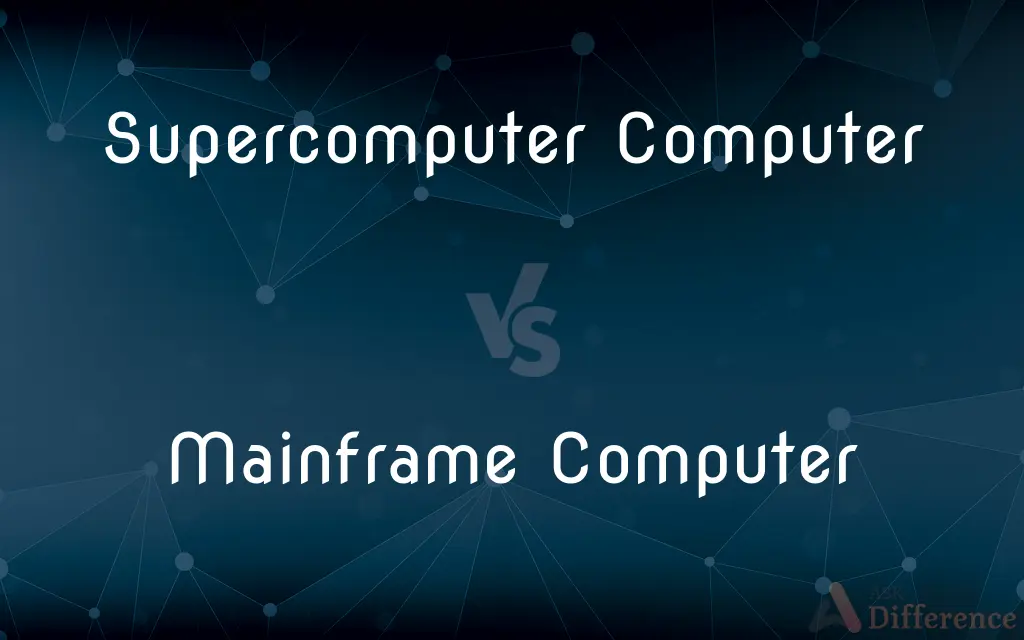Supercomputer Computer vs. Mainframe Computer — What's the Difference?
By Tayyaba Rehman — Published on January 1, 2024
Supercomputers are designed for processing complex, computation-intensive tasks at high speeds, while mainframe computers are optimized for data processing, transaction handling, and managing large databases reliably.

Difference Between Supercomputer Computer and Mainframe Computer
Table of Contents
ADVERTISEMENT
Key Differences
Supercomputers are highly advanced computing machines, primarily designed to execute complex and massive computational tasks, like scientific simulations and weather forecasting. Mainframe computers, on the other hand, are powerful machines used primarily by large organizations for critical applications, extensive data processing, and enterprise resource planning.
A supercomputer's architecture is focused on achieving high computational speeds and handling complex mathematical calculations, often using parallel processing. Mainframes emphasize reliability, scalability, and security, being used to manage vast databases, transaction processing, and resource planning in large enterprises.
Supercomputers are used extensively in scientific research, where processing speed and the ability to handle large-scale simulations are crucial. Mainframe computers are commonly found in commercial sectors like banking, where data integrity and transaction processing are vital.
The performance of supercomputers is often measured in FLOPS (Floating-Point Operations Per Second), highlighting their speed in executing calculations. For mainframes, the focus is on MIPS (Millions of Instructions Per Second) and the ability to handle a massive number of transactions or operations simultaneously.
Supercomputers are typically more expensive and require specialized environments for operation, including advanced cooling systems due to their intense processing power. Mainframes, while also expensive, are more geared towards long-term data processing and are designed for less energy-intensive, more continuous operations.
ADVERTISEMENT
Comparison Chart
Primary Use
Complex calculations, simulations, research.
Transaction processing, database management.
Design Focus
High-speed computations, parallel processing.
Reliability, scalability, security.
Typical Users
Research institutions, scientific applications.
Large organizations, banks, government agencies.
Performance Metric
Measured in FLOPS.
Measured in MIPS.
Operating Environment
Requires specialized cooling systems.
Designed for continuous, long-term operation.
Compare with Definitions
Supercomputer Computer
A supercomputer is a high-performance computing machine for complex computations.
The new supercomputer will be used for climate modeling and research.
Mainframe Computer
They are known for their reliability, scalability, and security features.
The insurance company upgraded its mainframe computer for better data security.
Supercomputer Computer
They excel in scientific simulations and data-intensive tasks.
The laboratory's supercomputer runs simulations of nuclear reactions.
Mainframe Computer
Mainframe computers are measured in millions of instructions per second (MIPS).
The new mainframe computer boasts a significantly higher MIPS rating.
Supercomputer Computer
Supercomputers are measured by their speed in floating-point operations per second.
Our supercomputer achieved record-breaking speeds in recent tests.
Mainframe Computer
Mainframe computers are used by organizations for critical business applications.
Our mainframe computer manages all the customer data and transaction records.
Supercomputer Computer
Supercomputers are essential for tasks requiring immense computational power.
Astronomers rely on supercomputers to process data from telescopes.
Mainframe Computer
Mainframes can handle a vast number of simultaneous transactions.
During peak hours, the mainframe computer processes thousands of transactions per second.
Supercomputer Computer
Supercomputers have advanced capabilities in processing and parallel computing.
Researchers used a supercomputer to simulate protein folding for drug discovery.
Mainframe Computer
A mainframe computer is a large, powerful machine designed for extensive data processing.
The bank uses a mainframe computer to handle millions of transactions daily.
Common Curiosities
Which is more powerful, a supercomputer or a mainframe?
Supercomputers are more powerful in raw computational ability, while mainframes excel in data processing.
Can mainframe computers handle complex scientific calculations like supercomputers?
While capable, they are not optimized for such tasks like supercomputers.
Are supercomputers larger than mainframe computers?
Supercomputers can be larger due to their extensive processing units.
Do banks use supercomputers for their operations?
Banks generally use mainframes for their reliability in handling transactions.
How often are mainframes updated compared to supercomputers?
Mainframes are updated less frequently, focusing on stability and reliability.
Can supercomputers be used for data warehousing?
They can, but mainframes are typically more efficient for this purpose.
Are supercomputers used for everyday business applications?
No, they are typically used for specialized scientific and research tasks.
Are supercomputers better at handling real-time data processing?
Yes, particularly for data-intensive scientific calculations.
What is the primary cost difference between the two?
Both are expensive, but supercomputers often have higher costs due to their specialized components.
What industries commonly use supercomputers?
Industries like scientific research, astronomy, and climate modeling use supercomputers.
Is parallel processing more common in supercomputers or mainframes?
Parallel processing is more common and crucial in supercomputers.
Is cloud computing replacing mainframes and supercomputers?
Cloud computing complements them but does not fully replace their specialized roles.
Are mainframes and supercomputers becoming more energy-efficient?
Yes, advancements in technology are making both more energy-efficient.
Can a mainframe be as fast as a supercomputer?
In terms of raw computational speed, mainframes are typically not as fast.
Do mainframes require the same level of cooling as supercomputers?
No, mainframes generally require less cooling than supercomputers.
Share Your Discovery

Previous Comparison
Java vs. Java EE
Next Comparison
Critical Angle vs. Acceptance AngleAuthor Spotlight
Written by
Tayyaba RehmanTayyaba Rehman is a distinguished writer, currently serving as a primary contributor to askdifference.com. As a researcher in semantics and etymology, Tayyaba's passion for the complexity of languages and their distinctions has found a perfect home on the platform. Tayyaba delves into the intricacies of language, distinguishing between commonly confused words and phrases, thereby providing clarity for readers worldwide.














































